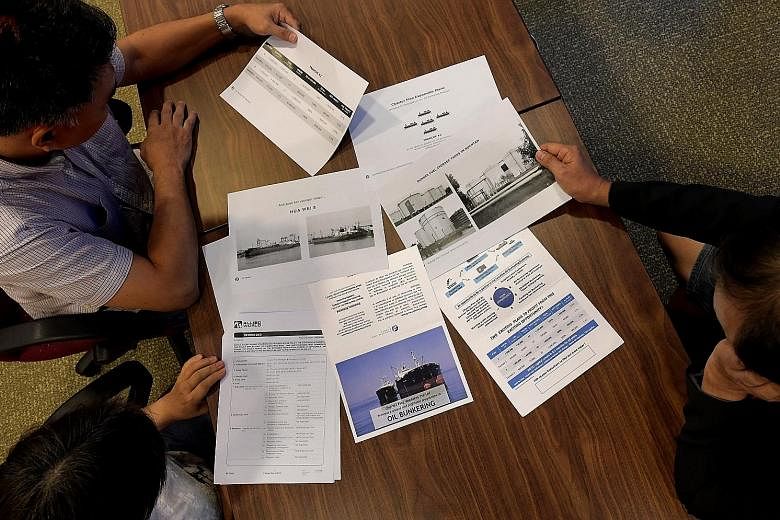An oil bunkering scheme that offered attractive returns of up to 15 per cent each month for cash investments with varying time periods has come under the spotlight. Oil bunkering refers to the supply of fuel for use by ships in a seaport.
Eight investors, who claimed that they put a total of more than US$1 million (S$1.4 million) into Charter Fine Ventures' (CFV) investment plans in 2014 and 2015, have filed police reports. The reports were against CFV and its Hong Kong- based holding firm Charter Fine Strategies & Management (CFSM).
It is believed that more than 100 investors from Singapore, Malaysia and Indonesia parked in excess of US$20 million with the investment scheme.
CFV has a paid-up capital of $10,000, according to records from the Accounting and Corporate Regulatory Authority. The directors are Hong Kong-based Mr Wong Leung Hang and Singaporean David Hong Yan Dean.
Mr Wong has not responded to e-mail from The Straits Times, and efforts to reach both Mr Wong and Mr Hong by telephone were not successful. CFV's Singapore office, which used to be at Ngee Ann City, was shut down around late 2015.
The firm offered investment plans of differing amounts and maturity periods, typically from 12 to 15 months.
Part-time insurance agent Melissa Lim, 55, invested US$200,000 in a 20-month plan with CFV in February 2015. She said she received two payouts each of 15 per cent of her investment sum earlier that year, before the payouts stopped. Mrs Lim and other investors say payments have dried up. In some cases, post-dated cheques from CFV have bounced.
She said: "These are my life savings and I was hoping to get higher returns by investing them. I thought I could retire early with my savings, but now I have to slog again."
A CFV brochure, which The Straits Times obtained, offered "an opportunity to be a partner in the lucrative oil bunkering business". It stated that it "has secured bunkering licences for multiple ports and locations in Malaysian waters" and "monthly profit-sharing disbursements" have commenced.
According to the brochure, investors could expect to break even after 8.3 months for all plans. Under a 15-month investment plan with monthly payouts of 12 per cent, a US$600,000 sum would generate monthly returns of US$72,000. This translates to a return of 180 per cent and total returns of US$1.08 million or a net profit of US$480,000, after 15 months.
Operations manager Dennis Deng, 47, invested US$100,000 in a CFV plan in March 2015, which offered 15 per cent monthly returns over 14 months. So far, he has received five payouts.
In his "strategic financial cooperation agreement" which The Straits Times obtained, it was stated that CFSM is a part of a group of companies that "has been developing and managing the facilities of the port of Maoming, province of Guangdong PRC (People's Republic of China), including fuel oil storage tanks, and container terminals under licences from the relevant authorities".
Mr Deng said: "I went in because I believed there was strong backing from the China government." He also wrongly perceived that there was insurance taken out by the company to protect the principal sums.
In the agreements, the investors were referred to as "accredited" or high net worth investors.
Grab driver Peter Wong, 54, said he invested US$150,000 in three CFV plans between September 2014 and May 2015, and has received three payouts. He took a loan to supplement the principal sum, and had expected 15 per cent returns in monthly payouts over 20 months.
A Malaysian retiree who wanted to be known only as Augustine L., 62, said that he invested US$85,000 in a CFV plan in April 2015 which could generate 15 per cent monthly returns over a 12-month period. He alleged that he has not received any payouts to date.
He claimed that in August last year, CFSM gave him a post-dated cheque dated Feb 28 this year, for an amount of HK$200,558 (S$36,120). However, the cheque has bounced.
CFSM sent letters to investors in 2015 and 2016 attributing the delays in monthly payouts to reasons such as "major fluctuations" in global markets and the "sliding of oil prices".
In one letter in 2015, Mr Wong said that the firm had always been adopting a conservative operation methodology to earn decent profits, while avoiding taking any risks in order to safeguard all the investment. He added that it had "decided to operate fewer cycles because of significant risks of possible loss... due to sliding oil prices".
He also said that the firm was very confident that it could "make the necessary returns".
Some of the investors are considering seeking legal advice from pro-bono lawyers.


